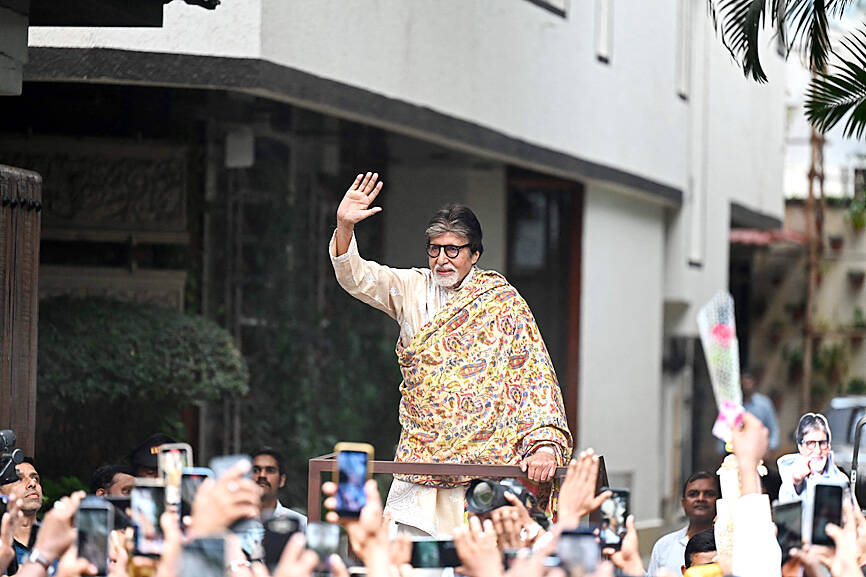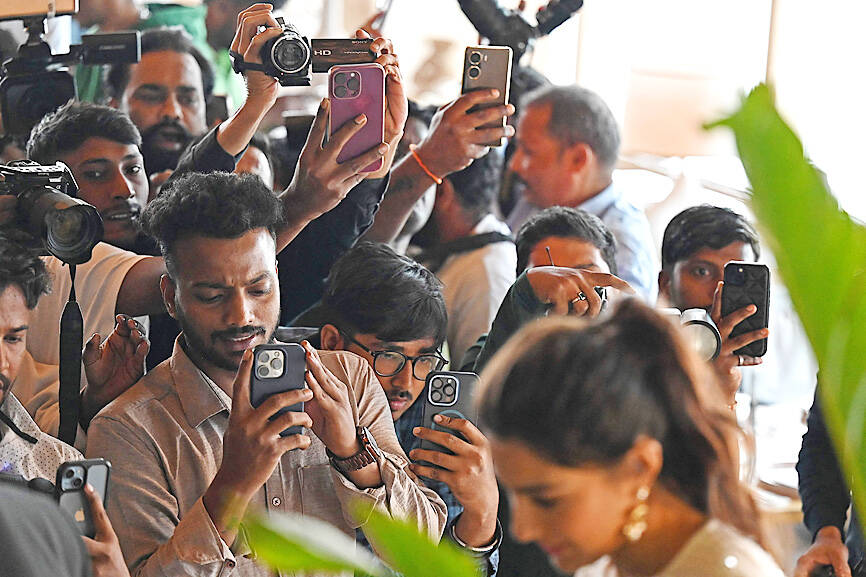From riding pillion on zooming motorbikes to round-the-clock airport stakeouts, India’s celebrity-hunting paparazzi photographers have gone from “outcasts” to becoming a key part of Bollywood’s vast film industry machine.
Times have changed for celebrity snapper Manav Manglani, who scored big at the wedding of Bollywood star Shilpa Shetty in 2009 by climbing a tree and perching on a branch for hours to spy over the venue’s walls.
“We ... were considered outcasts,” the photographer said, describing the early days of his trade.

Photo: AFP
Fifteen years later, Manglani pushes streams of content to more than 6.5 million followers on Instagram.
“We are part of the system now,” he said, commanding a squad of nearly 20 photographers who stake out popular gyms, chic cafes and luxury hotels, their phones buzzing with tips.
The team has divided the megacity into coverage zones, including someone stationed at the airport fulltime.

Photo: AFP
Mumbai-based Bollywood, the core of India’s Hindi-language film industry, is the longtime heart of moviemaking in the world’s most populous nation and a major cultural export.
In celebrity-obsessed India, it can be a lucrative trade.
Bollywood began a century ago, but it was in the 1970s that film magazines began publishing “inside” industry gossip, said Ram Kamal Mukherjee, a former editor-in-chief of Stardust magazine.
The Bollywood publication brought “stories from the studios, bedroom stories, stories from the makeup van,” he said.
The first wave of paparazzi began in India in the early 2000s, with freelance photographers chasing celebrities.
The insatiable demand by social media and ubiquitous availability of smartphones shifted gears again — with photographers no longer “just providing pictures,” but working to help produce a narrative, he said.
“Today there is intervention,” Mukherjee said, citing examples such as staged incidents where young actors seemingly spontaneously hand cash to beggars. “There is brand building.”
That has come alongside wider industry changes, including viewers shifting from the big screen.
Traditional blockbuster spectacles drawing crowds into cinemas have been challenged by long-format narratives on streaming platforms viewed at home, commonly called OTT or “over-the-top” services in India.
This has helped paparazzi develop a role in the publicity machine, observers say.
“Being an influencer with followers with a very popular page, helping them promote the movies, the OTT and the brands ... we are now important,” Manglani said.
Indian movies released in theatres raked in an “all-time high” of US$1.4 billion in box office revenue last year, according to consulting firm EY.
However, competition is fierce.
Mandvi Sharma, a former publicist for mega-star Shah Rukh Khan, said that the two sides can be “codependent,” especially for younger actors hoping photographers can boost their fame.
“Things have changed,” said Viral Bhayani, a photographer with more than 12 million Instagram followers, recalling how a decade ago he would have to “beg” for information about organized media events.
It has been quite a shift, “from being thrown out of places ... to now being called everywhere,” he said.
Bollywood also faces rising challenges from other Indian-language film centers. Of the country’s 1,796 cinema releases last year, just 218 were Bollywood’s traditional fare of Hindi-language movies, EY said.
Photographers now snap more candid images of celebrity daily lives, often more relatable to millions of fans than red carpet glamor or formal magazine shoots.
Despite their careers being more closely linked, old frictions remain, especially for big-name stars.
Last year, Bollywood star Alia Bhatt made a police complaint for “gross invasion” of privacy after two photographers took pictures of her at home from a neighboring rooftop.
However, Manglani said that his images are also a useful barometer to measure actors’ presence on the screen.
Producers, directors and the brands, “are keenly watching whom am I featuring ... what’s happening and what is the traction on that celebrity,” Manglani said. “We used to run behind them. We wanted money, we were earning by the picture... Now it’s both ways. They also need us, we also need them.”

‘HYANGDO’: A South Korean lawmaker said there was no credible evidence to support rumors that Kim Jong-un has a son with a disability or who is studying abroad South Korea’s spy agency yesterday said that North Korean leader Kim Jong-un’s daughter, Kim Ju-ae, who last week accompanied him on a high-profile visit to Beijing, is understood to be his recognized successor. The teenager drew global attention when she made her first official overseas trip with her father, as he met with Chinese President Xi Jinping (習近平) and Russian President Vladimir Putin. Analysts have long seen her as Kim’s likely successor, although some have suggested she has an older brother who is being secretly groomed as the next leader. The South Korean National Intelligence Service (NIS) “assesses that she [Kim Ju-ae]

In the week before his fatal shooting, right-wing US political activist Charlie Kirk cheered the boom of conservative young men in South Korea and warned about a “globalist menace” in Tokyo on his first speaking tour of Asia. Kirk, 31, who helped amplify US President Donald Trump’s agenda to young voters with often inflammatory rhetoric focused on issues such as gender and immigration, was shot in the neck on Wednesday at a speaking event at a Utah university. In Seoul on Friday last week, he spoke about how he “brought Trump to victory,” while addressing Build Up Korea 2025, a conservative conference

DEADLOCK: Putin has vowed to continue fighting unless Ukraine cedes more land, while talks have been paused with no immediate results expected, the Kremlin said Russia on Friday said that peace talks with Kyiv were on “pause” as Ukrainian President Volodymyr Zelenskiy warned that Russian President Vladimir Putin still wanted to capture the whole of Ukraine. Meanwhile, US President Donald Trump said that he was running out of patience with Putin, and the NATO alliance said it would bolster its eastern front after Russian drones were shot down in Polish airspace this week. The latest blow to faltering diplomacy came as Russia’s army staged major military drills with its key ally Belarus. Despite Trump forcing the warring sides to hold direct talks and hosting Putin in Alaska, there

North Korea has executed people for watching or distributing foreign television shows, including popular South Korean dramas, as part of an intensifying crackdown on personal freedoms, a UN human rights report said on Friday. Surveillance has grown more pervasive since 2014 with the help of new technologies, while punishments have become harsher — including the introduction of the death penalty for offences such as sharing foreign TV dramas, the report said. The curbs make North Korea the most restrictive country in the world, said the 14-page UN report, which was based on interviews with more than 300 witnesses and victims who had